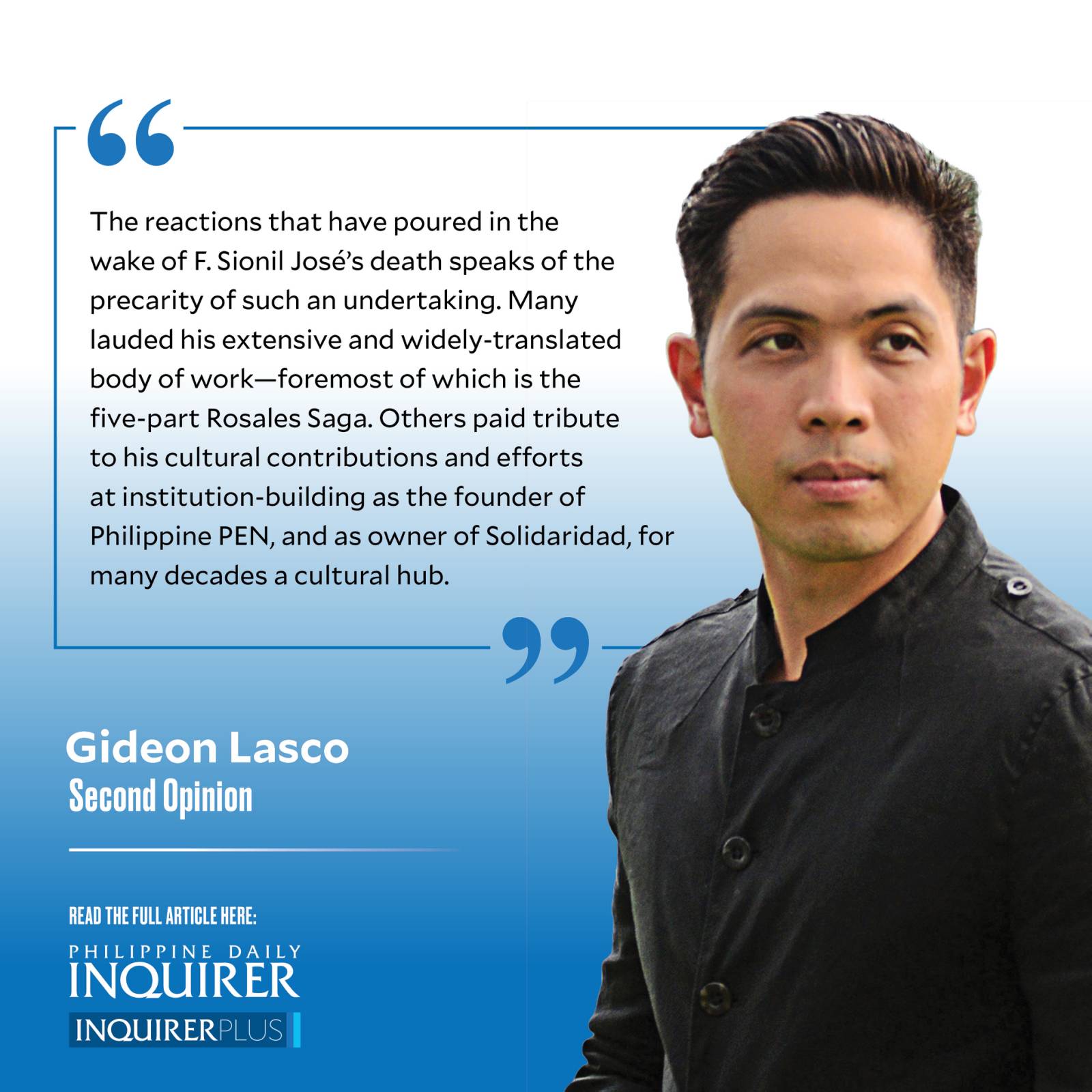
New York City—How does one comprehend the legacy of a National Artist who lived to the age of 97, whose career spanned generations, and whose letters ranged from allegorical novels to controversial Facebook posts?
The reactions that have poured in the wake of F. Sionil José’s death speaks of the precarity of such an undertaking. Many lauded his extensive and widely-translated body of work—foremost of which is the five-part Rosales Saga. Others paid tribute to his cultural contributions and efforts at institution-building as the founder of Philippine PEN, and as owner of Solidaridad, for many decades a cultural hub.
Inevitably, most eulogies likewise referenced his support for President Duterte, his suspiciousness towards Chinese-Filipinos, as well as his bewildering dismissals of this administration’s attacks on press freedom. As someone who had previously written against “lionizing the dead,” I welcome such critical assessments—as surely, he likewise would.
But at the same time, I would like to highlight a lesser-known part of his legacy that I have personally experienced and benefited from: his outreach to the younger generations.
I first met Manong Frankie when he gave a talk in our high school—UP Rural High—and I interviewed him for our school paper. At the end of our conversation, he asked me about my plans after graduation, and I told him that I had just qualified for the Intarmed program of the UP College of Medicine.
“Write to me once you’re in Manila,” he said. “My bookshop is just one block away.”
His invitation was the beginning of a long-standing correspondence and I would come to regard him as a mentor. Throughout my medical school days, I would visit his bookshop, Solidaridad, and listen as he held court with other writers and intellectual figures—and invariably join him and his wife, Manang Tessie, for dinner, usually in his favorite Japanese restaurant in Remedios. He and Manang happened to be in Tokyo when I was doing my medical elective in 2008, and I had the unforgettable experience of carrying his typewriter around Shibuya for a whole day.
Manong Frankie encouraged me to read voraciously and travel extensively, two things I took to heart, imparting them to my own students. More than those words of advice, however, I think his impact was to give me confidence. “You can be both a doctor and a writer,” he told me during that first encounter; words that meant a lot to a 16-year old probinsyano.
Eventually, I would realize that I was not alone in receiving such encouragement, and this has been reflected in the eulogies from people who had personally known him. His own words, as in this letter he wrote to me back in December 2006, at a time when he thought his end was near, were illustrative:
What can this old scribbler tell one so young and as hopeful as you in a country where hope is all but gone (or wasted)? I told you before that writing and doctoring are vocations and you will need a lot of patience, perseverance, compassion, and most of all, integrity, to pursue your vocation.
I cannot tell you to persevere because in the future you will be tested so hard, your patience will be shaken and your faith, most of all, will waver. And when you will have a family, and you will need food on the table … all of these will burden you with sorrow, even guilt, for you will have doubts about having chosen these vocations at all.
You will have to be understanding, compassionate, and forgiving. Forgiving—that is the most difficult of all to achieve, but you have to be, deep in your heart of hearts, if you are to prevail.
All those you love, remember, you will have to lose them. I only hope that all of them will be understanding, and patient. To those who really love you, return their love as best as you can so you will have no regret.
And of course, virtue is not enough. If you are going to be a doctor, excel at it. And doubly so because you want to be a writer too. Excel in the craft, too, and remember always that you are not writing for yourself alone, just as you are not a doctor (if and when you become one) for your self-satisfaction alone, but for the satisfaction of others.
I was in Los Baños last week, talking to the same students as I did talk before your class then, and from there, I went to the college to talk with other young people. Again, I told them that nationalism is love of country, and the logic of love is sacrifice. Remember this always as you head for the future which is full of grim challenges, which is bleak, but with young people like you, Filipinas will yet be redeemed.He mentored young people and believed in them.
—————-
glasco@inquirer.com.ph

